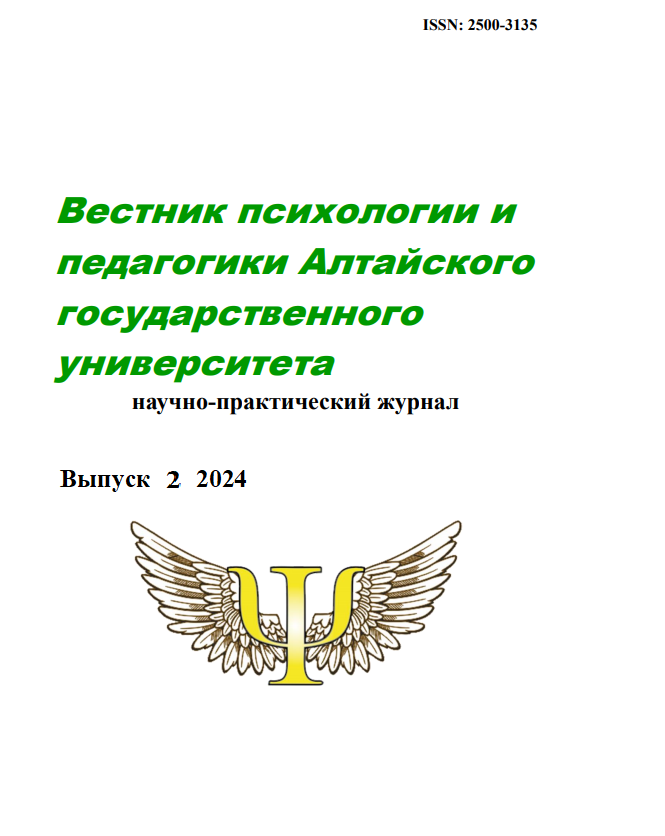EXPLORING THE PROPENSITY FOR EMOTIONAL DEPENDENCE AMONG WOMEN
УДК 159.9.
Abstract
The article presents the results of a study of the tendency to emotional dependence in women. The study was conducted at the National Research University "BelSU", the study sample consisted of 177 female students. In the process of research, using strictly formalized methods (R. Hirshfield’s Interpersonal Dependence Test adapted by O.P. Makushina, Test-questionnaire “Sovereignty of Psychological Space” by S.K. Nartova-Bochaver) and less formalized methods (observation and conversation) it was established that that a significant percentage of women in our sample have a tendency to emotional dependence, while they experience changes in the sovereignty of psychological space, consisting in the desire to receive emotional support from others, sensitivity to criticism, anxiety, self-doubt, and passivity. The conducted research is a pilot measurement of the tendency to emotional dependence, conducted as part of the preparation of a dissertation research.
Downloads
References
. Бушина А.А., Щербакова Ю.А. Эмоциональная зависимость: причины и особенности проявления // Актуальные проблемы здоровьесбережения в современном обществе: материалы Всероссийской научно-практической конференции, Курск, 17 октября 2019 г. Курск : Юго-Западный государственный университет, 2019. С. 38–41.
Гостенкова М.А. Связь личностных особенностей субъекта межличностных отношений с зависимостью от партнера / Сборник научных трудов «Общение в эпоху конвергенции технологий», М. : Российский государственный социальный университет, 2022. С. 138–144. URL: https://cyberleninka.ru/article/n/svyaz-lichnostnyh-osobennostey-subekta-mezhlichnostnyh-otnosheniy-s-zavisimostyu-ot-partnera
Друзьякова А.А. Больная любовь. Исцеление от эмоциональной зависимости. М. : ООО «Феникс», 2020. 340 с.
Егоров А.Ю. Нехимические (поведенческие) аддикции (обзор) // Аддиктология. 2005. № 1. С. 65–77.
Каменский П.И. Сопряженность специфики межличностной зависимости и субъективного благополучия во взрослости // Вестник Костромского государственного университета. Серия: Педагогика. Психология. Социокинетика. 2019. № 2. С. 41–45.
Макушина О.П. Методика определения межличностной зависимости. Р. Борнштейн. Адаптация О.П. Макушиной // Психология общения: энциклопед. сл. / под общ. ред. А.А. Бодалева. М., 2011. С. 111–122.
Пестов М.Г. Эмоциональная зависимость: от диагностики к стратегиям преодоления // Добросвет, Центр гуманитарных инициатив. 2010. № 1. С. 122–123.
Полянская Т.В. Психологическая граница личности, склонной к эмоциональной зависимости. М. : Кронос, 202. 320 с.
Хорни К. Невротическая личность нашего времени. М. : Айрис-пресс, 2004. 464 с.
Чукичева Н.Г. Межличностная зависимость в связи со свойствами интегральной индивидуальности женщин // Psy-Вышка : Сборник материалов Международной научной конференции, Санкт-Петербург, 20–22 мая 2021 года / отв. редактор Е.С. Горбунова. Санкт-Петербург: ООО «Скифия-принт», 2022. С. 171–172.
References:
Bushina A.A., Shherbakova Ju.A. Jemocional'naja zavisimost': prichiny i osobennosti projavlenija. Aktual'nye problemy zdorov'esberezhenija v sovremennom obshhestve. Proceed All-Russian Sc. Conf. Kursk, 17.10. 2019. Kursk : Jugo-Zapadnyj gosudarstvennyj universitet, 2019. P. 38–41.
Gostenkova M.A. Svjaz' lichnostnyh osobennostej sub’ekta mezhlichnostnyh otnoshenij s zavisimost'ju ot partnera. In: “Obshhenie v jepohu konvergencii tehnologij”, Moscow: Rossijskij gosudarstvennyj social'nyj universitet, 2022. P. 138–144. Available from: https://cyberleninka.ru/article/n/svyaz-lichnostnyh-osobennostey-subekta-mezhlichnostnyh-otnosheniy-s-zavisimostyu-ot-partnera
Druz'jakova A.A. Bol'naja ljubov'. Iscelenie ot jemocional'noj zavisimosti. Moscow: LLC “Feniks”, 2020. 340 p.
Egorov A.Ju. Nehimicheskie (povedencheskie) addikcii (obzor). Addiktologija. 2005. No 1. P. 65–77.
Kamenskij P.I. Soprjazhennost' specifiki mezhlichnostnoj zavisimosti i sub’ektivnogo blagopoluchija vo vzroslosti. Vestnik Kostromskogo gosudarstvennogo universiteta. Serija: Pedagogika. Psihologija. Sociokinetika. 2019. No 2. P. 41–45.
Makushina O.P. Metodika opredelenija mezhlichnostnoj zavisimosti. R. Bornshtejn. Adaptacija O.P. Makushinoj. Psihologija obshhenija: jencikloped. sl. Pod obshh. red. A.A. Bodaleva. Moscow, 2011. P. 111–122.
Pestov M.G. Jemocional'naja zavisimost': ot diagnostiki k strategijam preodolenija. Dobrosvet, Centr gumanitarnyh iniciativ. 2010. No 1. P. 122–123.
Poljanskaja T.V. Psihologicheskaja granica lichnosti, sklonnoj k jemocional'noj zavisimosti. Moscow: Kronos, 202. 320 p.
Horni K. Nevroticheskaja lichnost' nashego vremeni. Moscow: Ajris-press, 2004. 464 p.
Chukicheva N.G. Mezhlichnostnaja zavisimost' v svjazi so svojstvami integral'noj individual'nosti zhenshhin. Psy-Vyshka: Proceed. Int. Sc. Conf. Saint Petersburg, 20–22.05.2021. E.S. Gorbunova (Ed.). Saint Petersburg: LLC “Skifija-print”, 2022. P. 171-172.
Copyright (c) 2024 Оксана Юрьевна Кушко, Татьяна Николаевна Разуваева

This work is licensed under a Creative Commons Attribution 4.0 International License.
Bulletin of Psychology and Pedagogy of Altai State University is a golden publisher, as we allow self-archiving, but most importantly we are fully transparent about your rights.
Authors may present and discuss their findings ahead of publication: at scientific conferences, on preprint servers, in public databases, and in blogs, wikis, tweets, and other informal communication channels.
Bulletin of Psychology and Pedagogy of Altai State University allows authors to deposit manuscripts (currently under review or those for intended submission) in non-commercial, pre-print servers such as ArXiv.
Authors who publish with this journal agree to the following terms:
- Authors retain copyright and grant the journal right of first publication with the work simultaneously licensed under a Creative Commons Attribution License that allows others to share the work with an acknowledgement of the work's authorship and initial publication in this journal.
- Authors are able to enter into separate, additional contractual arrangements for the non-exclusive distribution of the journal's published version of the work (e.g., post it to an institutional repository or publish it in a book), with an acknowledgement of its initial publication in this journal.
- Authors are permitted and encouraged to post their work online (e.g., in institutional repositories or on their website) prior to and during the submission process, as it can lead to productive exchanges, as well as earlier and greater citation of published work (See The Effect of Open Access).







